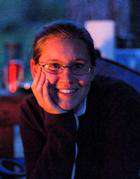Museum Info
Location
Room 166
Contact
The Edward H. Burtt Jr. Curatorial Director
Zoology Laboratory Coordinator
740-368-3887
lmtabak@owu.edu

Sarah Manor Luttrell ’07 says her time as student-curator helped her transition after graduation from a museum technician, to a museum fellow, to a doctoral candidate at the University of Maryland Baltimore County.
 I wasn’t sure I wanted to work in the museum at first.
I wasn’t sure I wanted to work in the museum at first.
It seemed daunting to have a job outside of my coursework and the leadership positions I held on campus.
I’m sure this is the experience of OWU students past and present, wondering if they can take on one more responsibility.
But Jed was subtle and persistent. He was going to be on sabbatical the coming fall, just when there were some changes coming to the museum, and he needed someone in place to make them happen.
It might have simply been a case of being in the right place at the right time, but I really believe he saw something in my particular skills and attributes that I didn’t know to look for.
The task fit me perfectly. Here my meticulous desire for organization was valued rather than seen as a charming quirk. It never felt like a job or a chore. Rather, it felt like an adventure and an opportunity.
One of my early tasks was helping to facilitate a trade of several hundred historic bird study skins to a larger museum in exchange for newer specimens of western species that could be used as course material.
Jed always had this vision for the museum, that it should function both as a library of scientific data and meet the needs of the students.
When the sturdy cardboard boxes arrived, light weight for their size and packed deep with cotton it felt like Christmas morning.
I spent weeks carefully unwrapping and seeing for the first time some of the birds I’d become so familiar with from the pages of my field guides, but never experienced in person. They are always better in person.
This was the first time that the Latin names of animals held true meaning for me. With each species lined up inside the cabinets, I could really see and appreciate the diversity and relationships among the different lineages.
The early 2000s was a revolution of phylogenetic rearrangement, and updating the organization of our moderate collection hammered home the enormity of what the scientific community was, and still is, learning about evolution.
Concepts from my anatomy and evolution classes were coming alive, and I was becoming even more engaged with those courses. …
When I graduated from OWU and became a seasonal field technician, it wasn’t long before I missed the rhythm of the museum.
Jed suggested I get in touch with a fellow W.D. Stull curator alum who had become a collections manager and a major research museum, Andy Johnson, and ask him how to move forward in the field.
It just so happened Andy had a colleague looking for a technician. Having the experience from the [Brant] Museum made it possible for me to land the job at the Museum of Southwestern Biology, and then to move on to the Denver Museum of Nature and Science as a fellow in Ornithology, and finally on to a Ph.D. program in Evolutionary Biology with the hope of contributing to and benefiting from museums for years to come.
In my dissertation work studying the earliest stages of species divergence, I have collected data from study specimens in a number of museums. I know the value of natural history collections both small and large. I have had the opportunity to walk by the specimen cabinets labeled “C. Darwin”, and peak and study skins contributed and prepared by “T. Roosevelt.”
I am following in the footsteps of these venerated natural historians who also believed in the value of museums. I’ve seen extinct animals in person. The ivory-billed woodpecker, the passenger pigeon, the first stegosaurus ever excavated from the earth.
None of these experiences, or the place I am professionally today, would have happened without the [Brant] Museum. …
– Sarah (Manor) Luttrell ’07